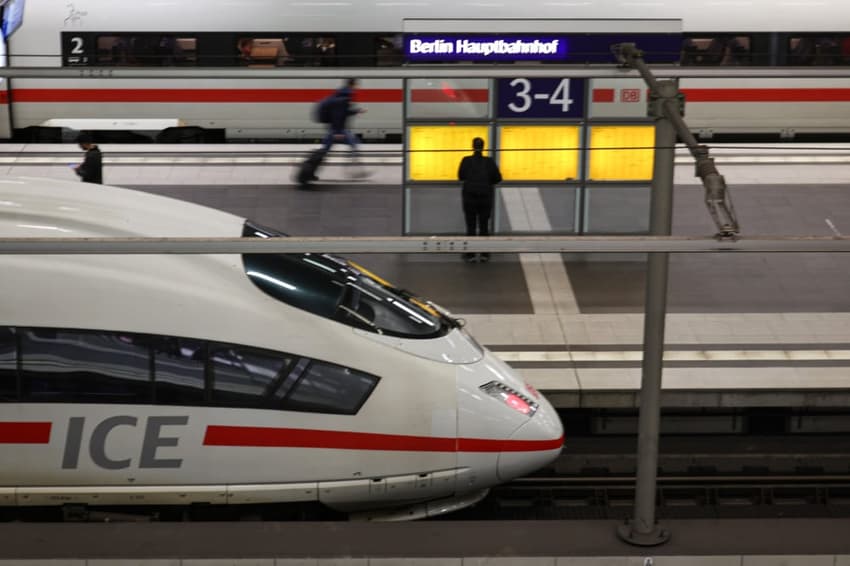'A difficult road': Strike-hit German rail operator agrees to shorter work week

German rail operator Deutsche
Bahn said Tuesday it had agreed with the GDL union to shorten train drivers' working week, ending a months-long row that caused strikes across the country.
"It was a difficult road," Deutsche Bahn's human resources director Martin Seiler told a press conference. "But in the end we were able to reach an intelligent compromise."
Under the terms of the agreement, the standard working week will be gradually shortened from 38 hours to 35 hours by 2029 with no loss in wages, Deutsche Bahn said.
But train drivers will have the option of working longer hours, up to 40 per week, at 2.7 percent more salary per additional hour.
"Our colleagues can decide for themselves which weekly working hours suit them and their lifestyle best," Seiler said.
He called it a "modern" solution that would bring "flexibility" to the profession, at a time when Germany is grappling with a shortage of skilled labour.
As part of the deal, all workers will also receive a wage hike of €420 per month in two stages and a one-off payment of €2,850 to help compensate for inflation.
Cost of living
The agreement brings an end to a bitter dispute between the operator and the GDL union which led to six rounds of walkouts since November 2023, causing travel misery for thousands of passengers.
READ ALSO: Why Germany is being hit by strikes almost every day
The deal will run until the end of 2025 and both sides have ruled out any further strike action for nearly two years.
"The good news is that there will be no rail strikes until at least the end of February 2026," Seiler said.
"We've done it," GDL boss Claus Weselsky said at a press conference.
"We regret that passengers have been so affected by our strikes," he said, adding: "This dispute should not have been as long or as hard as it was."
Germany, Europe's largest economy, has been affected by strikes in a wide range of sectors in recent months, including air travel, public transport, the civil service and supermarkets.
Pinched by inflation over recent following the war in Ukraine and the coronavirus pandemic, workers are demanding higher wages to cope with shrinking purchasing power.
The strikes added to an already gloomy economic picture, with the German economy shrinking 0.3 percent across the whole of last year.
Deutsche Bahn, which made a net loss of €2.35 billion in 2023, said last year's walkouts alone cost it some €200 million.
Comments
See Also
"It was a difficult road," Deutsche Bahn's human resources director Martin Seiler told a press conference. "But in the end we were able to reach an intelligent compromise."
Under the terms of the agreement, the standard working week will be gradually shortened from 38 hours to 35 hours by 2029 with no loss in wages, Deutsche Bahn said.
But train drivers will have the option of working longer hours, up to 40 per week, at 2.7 percent more salary per additional hour.
"Our colleagues can decide for themselves which weekly working hours suit them and their lifestyle best," Seiler said.
He called it a "modern" solution that would bring "flexibility" to the profession, at a time when Germany is grappling with a shortage of skilled labour.
As part of the deal, all workers will also receive a wage hike of €420 per month in two stages and a one-off payment of €2,850 to help compensate for inflation.
Cost of living
The agreement brings an end to a bitter dispute between the operator and the GDL union which led to six rounds of walkouts since November 2023, causing travel misery for thousands of passengers.
READ ALSO: Why Germany is being hit by strikes almost every day
The deal will run until the end of 2025 and both sides have ruled out any further strike action for nearly two years.
"The good news is that there will be no rail strikes until at least the end of February 2026," Seiler said.
"We've done it," GDL boss Claus Weselsky said at a press conference.
"We regret that passengers have been so affected by our strikes," he said, adding: "This dispute should not have been as long or as hard as it was."
Germany, Europe's largest economy, has been affected by strikes in a wide range of sectors in recent months, including air travel, public transport, the civil service and supermarkets.
Pinched by inflation over recent following the war in Ukraine and the coronavirus pandemic, workers are demanding higher wages to cope with shrinking purchasing power.
The strikes added to an already gloomy economic picture, with the German economy shrinking 0.3 percent across the whole of last year.
Deutsche Bahn, which made a net loss of €2.35 billion in 2023, said last year's walkouts alone cost it some €200 million.
Join the conversation in our comments section below. Share your own views and experience and if you have a question or suggestion for our journalists then email us at [email protected].
Please keep comments civil, constructive and on topic – and make sure to read our terms of use before getting involved.
Please log in here to leave a comment.